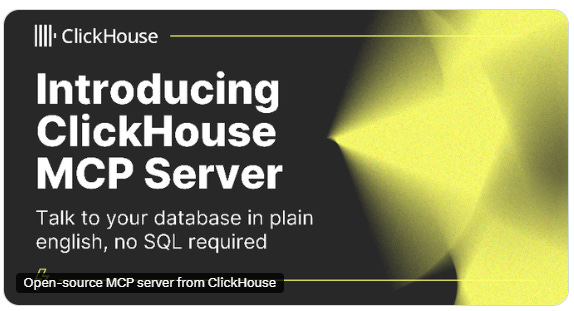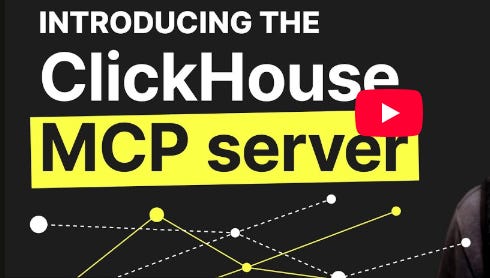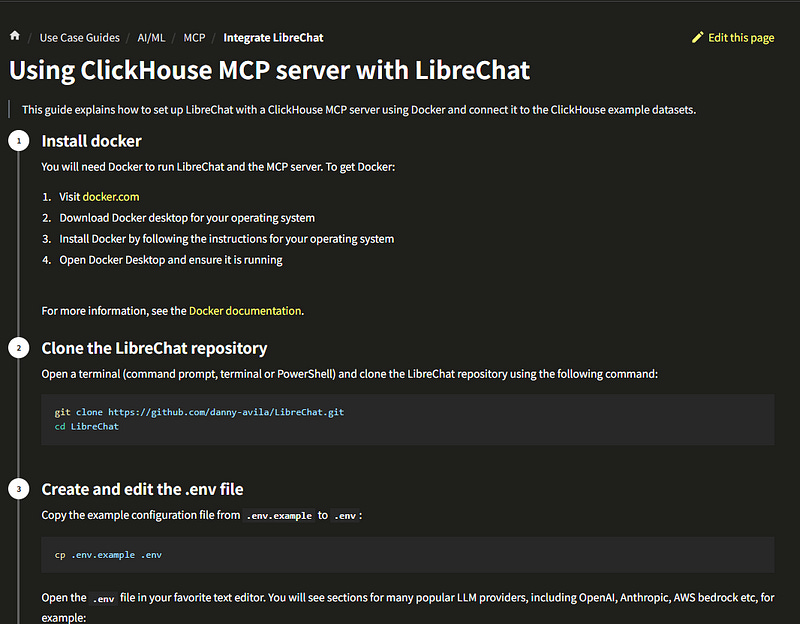What is MCP? (And Why ClickHouse is Pushing It So Hard)
If you’ve been following ClickHouse recently, you might have noticed something new in their blog posts, community talks, and even GitHub…
If you’ve been following ClickHouse recently, you might have noticed something new in their blog posts, community talks, and even GitHub repos: MCP. It keeps popping up, and not just in passing. ClickHouse is actively building around it, writing tutorials, and positioning it as a core part of their integration story.
So, what exactly is MCP? And why is ClickHouse betting so heavily on it?
this is clickhouse mcp server youtube url:link
What is MCP?
MCP stands for Model Context Protocol, an open standard originally introduced by Anthropic.
Think of it as a bridge between large language models (LLMs) and the outside world — databases, APIs, tools, or any service you might want an AI agent to interact with.
Instead of building one-off integrations for every model and every tool, MCP defines a common client-server protocol (built on JSON-RPC 2.0) that handles:
Tool invocation
Resource listing (like databases, tables, files)
Error handling & logging
Progress tracking
On the client side, you have apps like Claude Desktop, ChatGPT, Cursor, Windsurf, and others that already speak MCP. On the server side, you can expose your own service — in this case, ClickHouse — as an MCP-compatible endpoint.
The result? A model can seamlessly query or interact with your service without custom glue code.
Why ClickHouse Cares
At first glance, ClickHouse is “just” a fast analytical database. So why are they spending so much effort on MCP?
Here’s the reasoning:
1. Making AI-Native Data Access Simple
When a user is inside Claude or ChatGPT, they don’t want to copy-paste credentials or hand-craft SQL queries. They want to ask:
“Show me the top 10 cities by revenue growth this quarter.”
With ClickHouse’s MCP server, the model can:
List available databases and schemas
Suggest relevant queries
Run them in a read-only mode for safety
Return structured results
This bridges the gap between AI agents and data warehouses.
2. Keeping the Experience Fast
ClickHouse is known for performance. But if an LLM integration feels slow or clunky, the user experience falls apart.
MCP provides a consistent, low-latency channel for queries, keeping AI conversations smooth — no waiting 30 seconds for a dashboard refresh.
3. Security and Trust
By default, the ClickHouse MCP server exposes only read-only access. Credentials are managed via environment variables, and the model can’t mutate data unless you explicitly allow it.
This matters: enterprises will only adopt AI-driven workflows if they trust that their core databases won’t be silently altered.
4. Ecosystem and Future-Proofing
ClickHouse isn’t just adopting MCP for today. They see the protocol gaining traction across AI platforms. By jumping in early, they ensure:
Developers can plug ClickHouse into any MCP-compatible client
Agents can treat ClickHouse as a first-class citizen in their workflows
Community projects (like CopilotKit, FlowHunt, or custom LLM apps) can integrate without extra friction
In other words, MCP is becoming the API standard for AI tools, and ClickHouse wants to be there from day one.
Real-World Examples
ClickHouse’s blog shows a few use cases that make this vision concrete:
Claude Desktop → directly querying ClickHouse for analysis
CopilotKit + MCP → building agentic apps that take natural language and return ClickHouse-powered charts
FlowHunt → integrating database queries into AI research workflows
These aren’t just demos — they hint at a world where AI assistants become a natural front-end for analytics.
My Take
ClickHouse is playing a smart long game here.
MCP is still new, but it has momentum. If it does become the “HTTP of AI integrations,” ClickHouse stands to benefit massively by being one of the first databases to support it.
For developers, this means less glue code and fewer custom APIs. For businesses, it means smoother adoption of AI-driven analytics.
Personally, I see MCP as an enabling layer. It won’t make AI better at reasoning, but it makes AI more useful — because now the model isn’t limited to its training data. It can pull real numbers, in real time, from a real database.
That’s a big deal. And ClickHouse knows it.
Mark Needham
Learn how to integrate LibreChat, a popular open-source library for building ChatGPT clones, with the ClickHouse MCP server. This tutorial walks you through the complete setup process using Docker, from cloning the repositories to making your first query.
Step-by-step guide to clone and configure LibreChat with ClickHouse
Docker setup instructions for easy deployment
Configuration of API keys and environment files
Demonstration of querying interesting datasets (NYC Taxis, GitHub events, YouTube, etc.)
Analysis example: discovering tip patterns in New York taxi data




